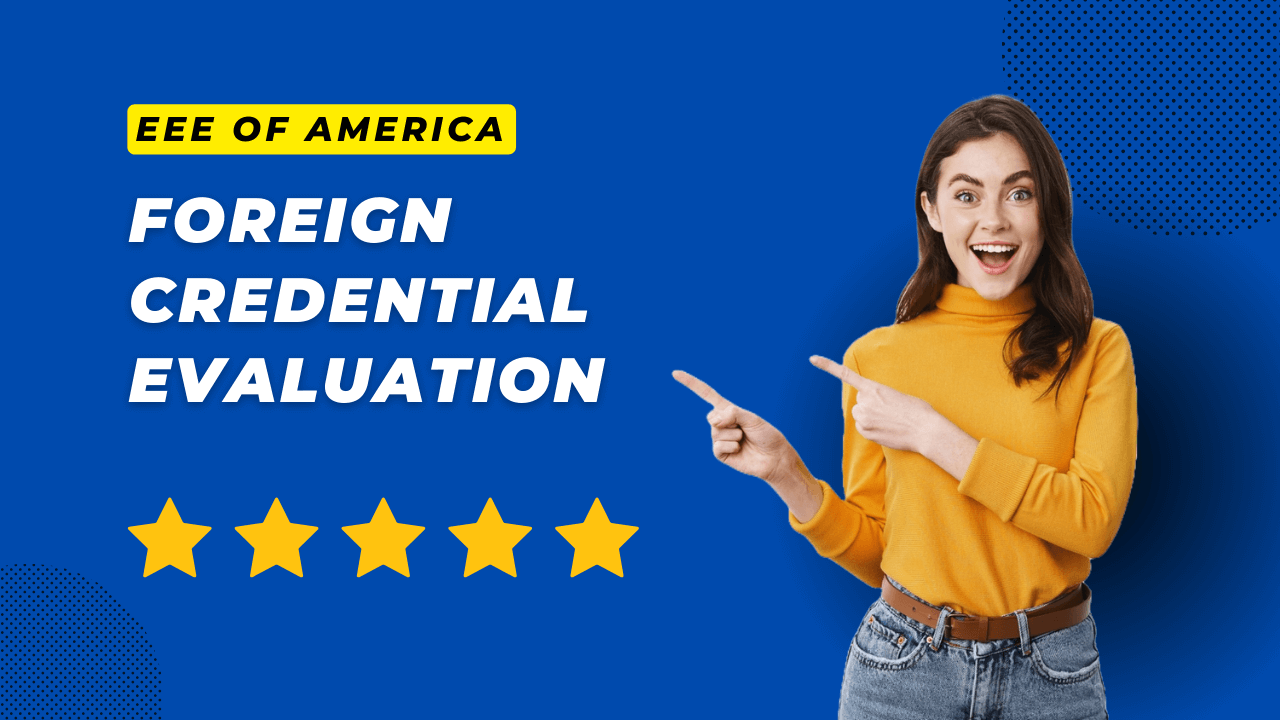» Take the leap with EEE of America! Get your foreign credentials evaluated accurately and unlock new opportunities in the U.S. Reach out today!
The Essence of Foreign Credential Evaluation
At its core, foreign credential evaluation is the process of assessing and interpreting academic qualifications obtained outside a specific country or region. It serves as a bridge, translating the language of international education into terms that resonate with local academic institutions, employers, and licensing bodies.
This evaluation is crucial for various purposes, including:
- Pursuing Higher Education: Whether you aspire to enroll in a graduate program or seek admission to a professional course, a foreign credential evaluation validates your eligibility by demonstrating the equivalence of your international qualifications.
- Securing Employment: Many employers, particularly in regulated professions, require foreign credential evaluations to ensure that your educational background aligns with their job requirements and industry standards.
- Obtaining Professional Licenses: If you plan to practice your profession in a new country, licensing boards often mandate foreign credential evaluations as part of the registration process, ensuring you possess the necessary qualifications.
Choosing the Right Evaluation Service Provider
Selecting a reputable and accredited organization to conduct your foreign credential evaluation is akin to choosing a trusted guide for your journey.
Here are some factors to consider:
- Accreditations and Memberships: Look for service providers that are members of recognized associations, such as the National Association of Credential Evaluation Services (NACES) or the Association of International Credential Evaluators (AICE). These memberships ensure adherence to rigorous standards and best practices.
- Experience and Expertise: Opt for organizations with a proven track record and extensive experience in evaluating credentials from various countries and educational systems. Their expertise can navigate the complexities of diverse academic backgrounds seamlessly.
- Turnaround Time: Consider the processing time required for your evaluation, as timely results are often crucial for meeting application deadlines or employment opportunities.
- Customer Reviews and Testimonials: Read reviews and testimonials from past clients to gauge the service provider’s reliability, professionalism, and customer satisfaction.
Gathering and Submitting Required Documentation
Preparing and submitting the necessary documentation is a critical step in the foreign credential evaluation process.
While requirements may vary depending on the country and evaluation type, common documents include:
- Academic Transcripts: Official transcripts detailing your coursework, grades, and credit hours from all educational institutions attended.
- Degree Certificates or Diplomas: Original or certified copies of your degree certificates or diplomas, indicating the successful completion of your academic program.
- Course Descriptions or Syllabi: Detailed descriptions or syllabi of the courses you have taken, which can aid in determining subject equivalencies.
- Translations: If your academic documents are not in English, you may need to provide certified translations from an accredited translation service.
It is essential to carefully review the documentation requirements provided by your chosen evaluation service provider and ensure that you submit complete and accurate information to avoid delays or additional requests.
Understanding the Evaluation Process
Once you have submitted your application and supporting documents, the evaluation service provider will meticulously analyze your credentials.
This process typically involves:
- Verifying Document Authenticity: The service provider will ensure that your submitted documents are authentic and issued by recognized educational institutions.
- Assessing Course Content and Credit Hours: Evaluators will review the course descriptions, syllabi, and credit hours to determine the equivalence of your coursework to the local educational system.
- Calculating Grade Point Averages (GPAs): Your grades and academic performance will be converted to the grading scale used in the country or region where you seek recognition.
- Determining Degree Equivalencies: Based on the analysis, your foreign credentials will be mapped to their corresponding academic levels, such as associate’s, bachelor’s, master’s, or doctoral degrees, within the local educational framework.
- Issuing the Evaluation Report: Upon completion of the evaluation process, you will receive a comprehensive report detailing the equivalence of your foreign credentials, facilitating their recognition and acceptance by relevant institutions or employers.
Leveraging the Evaluation Report
The foreign credential evaluation report serves as a powerful tool in your academic or professional journey.
Here are some ways you can leverage its value:
- Educational Admissions: Submit the evaluation report as part of your application package to universities or colleges, demonstrating your eligibility for admission to the desired program.
- Employment Opportunities: Present the report to potential employers, highlighting your qualifications and their equivalence to local standards, enhancing your competitiveness in the job market.
- Professional Licensing: Use the evaluation report as supporting documentation when applying for professional licenses or certifications, ensuring that your foreign credentials meet the required standards.
- Immigration Purposes: In certain cases, foreign credential evaluations may be required as part of the immigration process, particularly when seeking employment-based visas or permanent residency.
By understanding the significance of foreign credential evaluation and navigating the process effectively, you can unlock a world of opportunities, paving the way for academic and professional growth on a global scale.
Exploring the Realm of Credential Evaluation Services
As you embark on your journey of foreign credential evaluation, it is essential to familiarize yourself with the various services offered by reputable providers. These services are designed to cater to your specific needs and ensure a seamless and efficient evaluation process.
Education Evaluations
Education evaluations are the cornerstone of foreign credential evaluation services. These evaluations assess your academic qualifications, such as degrees, diplomas, and certificates, and determine their equivalence within the educational system of the country or region where you seek recognition.
There are typically two main types of education evaluations:
- Document-by-Document Evaluation: This evaluation provides a comprehensive report detailing your educational credentials, including the name of the institution attended, the dates of attendance, and the degree or diploma earned. It also outlines the corresponding equivalence within the local educational system.
- Course-by-Course Evaluation: In addition to the information provided in a document-by-document evaluation, a course-by-course evaluation offers a detailed analysis of each individual course you have completed. This includes a breakdown of the course content, credit hours, and grade equivalencies, facilitating a more in-depth understanding of your academic background.
Work Experience Evaluations
For professionals seeking employment opportunities or immigration pathways, work experience evaluations are invaluable.
These evaluations assess your professional experience, skills, and qualifications, providing a comprehensive report that outlines their equivalence to industry standards and job requirements within the target country or region.
Work experience evaluations can be particularly useful for individuals seeking skilled worker visas, employment-based immigration programs, or professional licensing and certification.
Expert Opinion Letters
In certain cases, expert opinion letters can supplement your foreign credential evaluation or immigration application. These letters are written by industry experts or university professors and provide an authoritative assessment of your qualifications, work experience, or the specific requirements of your profession.
Expert opinion letters can be instrumental in addressing Requests for Evidence (RFEs) or Notices of Intent to Deny (NOIDs) issued by immigration authorities, or in appealing adverse decisions related to your application.
Position Evaluations
Position evaluations are designed to evaluate the nature and complexity of a specific job or position within an organization. These evaluations are often requested by employers or immigration authorities to determine the appropriate classification or wage level for a particular role.
By providing a detailed analysis of the job duties, responsibilities, and required qualifications, position evaluations can support employment-based visa applications or assist in establishing fair compensation and job classifications.
Certified Translations
In the realm of foreign credential evaluation, certified translations play a crucial role. If your academic or professional documents are not in English, reputable evaluation service providers offer certified translation services to ensure accurate and reliable translations.
Certified translations are performed by qualified and accredited translators, ensuring that the content and nuances of your documents are accurately conveyed in the target language, facilitating a seamless evaluation process.
Consulting Services
Navigating the complexities of foreign credential evaluation can be challenging, especially when dealing with unique or complex situations.
To address this, many evaluation service providers offer consulting services, where you can work closely with experienced professionals to ensure a smooth and successful evaluation process.
These consultants can provide guidance on document requirements, evaluation strategies, and the interpretation of evaluation reports, ensuring that you make informed decisions and maximize the impact of your foreign credentials.
By understanding the diverse range of services available, you can select the options that best align with your specific needs and goals, whether it’s pursuing further education, securing employment, obtaining professional licenses, or navigating immigration processes.
Recognizing Foreign Qualifications: The Institutional Perspective
While foreign credential evaluation is often perceived as a process primarily focused on individuals, it is equally important to understand the institutional perspective. Academic institutions, employers, licensing bodies, and government agencies play a crucial role in recognizing and valuing foreign qualifications.
Educational Institutions
Universities and colleges have dedicated admissions offices that guide the evaluation of foreign credentials for enrollment purposes. These offices work closely with reputable credential evaluation service providers to ensure that applicants’ qualifications are accurately assessed and meet the institution’s admission requirements.
By partnering with experienced evaluators, educational institutions can make informed decisions, fostering a diverse and globally inclusive student body while maintaining academic standards.
Employers and Professional Organizations
In the professional realm, employers and industry organizations rely on foreign credential evaluations to assess the qualifications of international candidates or employees. Human resources departments and hiring managers utilize these evaluations to ensure that applicants’ educational backgrounds align with job requirements and industry standards.
Additionally, professional organizations and licensing boards often mandate foreign credential evaluations as part of the registration or certification process, safeguarding the integrity of their professions and ensuring that practitioners meet the necessary qualifications.
Immigration Authorities and Government Agencies
Foreign credential evaluations play a pivotal role in immigration processes, particularly when seeking employment-based visas or permanent residency.
Immigration authorities, such as the United States Citizenship and Immigration Services (USCIS), recognize evaluations from accredited service providers as a means of verifying an applicant’s educational and professional qualifications.
Government agencies also rely on these evaluations to assess the eligibility of individuals for various programs, such as skilled worker immigration streams or professional licensing initiatives, ensuring a fair and transparent evaluation process.
By understanding the institutional perspective, individuals can better navigate the requirements and expectations of academic institutions, employers, licensing bodies, and government agencies, ultimately increasing their chances of success in their academic or professional endeavors.
Tips for a Smooth and Personalized Evaluation Journey
While the foreign credential evaluation process may seem daunting at first, there are several strategies you can employ to ensure a smooth and personalized experience.
Here are some valuable tips to keep in mind:
- Start Early: Initiate the evaluation process well in advance of any application deadlines or employment opportunities. This will provide you with ample time to gather the necessary documents, address any potential issues, and receive your evaluation report without unnecessary delays.
- Stay Organized: Maintain a well-organized file or folder containing all your academic and professional documents, including transcripts, diplomas, course descriptions, and any relevant certifications or licenses. This will streamline the document submission process and ensure that you have all the required materials readily available.
- Communicate Effectively: Establish clear and open communication channels with your chosen evaluation service provider. Don’t hesitate to ask questions, seek clarification, or address any concerns you may have throughout the process. Effective communication can help resolve potential issues and ensure a smoother evaluation experience.
- Understand Cultural Nuances: Be aware that educational systems and grading scales can vary significantly across countries and cultures. Familiarize yourself with the nuances of your home country’s educational system and be prepared to provide context or additional information if requested by the evaluators.
- Leverage Technology: Many reputable evaluation service providers offer online portals or digital platforms where you can securely upload your documents, track the progress of your evaluation, and receive your final report. Embrace these technological solutions to streamline the process and ensure efficient communication.
- Seek Guidance: If you encounter challenges or have unique circumstances that require additional assistance, consider seeking guidance from educational advisors or consulting services offered by evaluation providers. Their expertise can help navigate complex situations and provide personalized solutions tailored to your specific needs.
- Embrace Diversity: Recognize that the foreign credential evaluation process is designed to celebrate and embrace the diversity of educational backgrounds and experiences. Approach the process with an open mind, appreciating the opportunity to showcase your unique qualifications and contribute to a globally inclusive academic or professional environment.
By following these tips and embracing a proactive and collaborative approach, you can transform the foreign credential evaluation process into a personalized and rewarding journey, paving the way for academic and professional success on a global scale.
The Future of Foreign Credential Evaluation: Embracing Innovation and Inclusivity
As the world continues to become increasingly interconnected, the importance of foreign credential evaluation will only grow. Embracing innovation and fostering inclusivity will be paramount in shaping the future of this critical process.
Leveraging Technology and Digitalization
Technological advancements have the potential to streamline and enhance the foreign credential evaluation process. Digital platforms and online portals can facilitate efficient document submission, secure data storage, and seamless communication between applicants and evaluators.
Furthermore, the integration of artificial intelligence and machine learning algorithms can aid in the analysis and evaluation of academic credentials, reducing processing times and increasing accuracy. However, it is crucial to maintain human oversight and expertise to ensure the nuances and complexities of diverse educational systems are properly addressed.
Fostering Global Collaborations and Standardization
As the world becomes increasingly interconnected, fostering global collaborations and establishing standardized practices in foreign credential evaluation will be essential. International organizations and associations can play a pivotal role in facilitating dialogue, sharing best practices, and promoting the recognition of qualifications across borders.
By aligning evaluation methodologies and establishing mutual recognition agreements, the process of foreign credential evaluation can become more streamlined and consistent, reducing barriers and promoting academic and professional mobility.
Promoting Inclusivity and Diversity
Foreign credential evaluation plays a crucial role in fostering inclusivity and embracing diversity within academic institutions, workplaces, and professional communities. By recognizing and valuing the qualifications of individuals from diverse backgrounds, we can create more inclusive and equitable environments that celebrate different perspectives and experiences.
Evaluation service providers and stakeholders must strive to eliminate biases and ensure fair and equitable assessment practices, promoting equal opportunities for individuals regardless of their country of origin or educational background.
Continuous Learning and Adaptation
The landscape of education and professional qualifications is constantly evolving, with new programs, certifications, and educational models emerging. Evaluation service providers must remain agile and committed to continuous learning, adapting their methodologies and expertise to stay relevant and accurately assess these evolving credentials.
Ongoing research, collaboration with educational institutions and professional bodies, and regular updates to evaluation guidelines and practices will be essential to maintain the integrity and relevance of foreign credential evaluation services.
By embracing innovation, fostering global collaborations, promoting inclusivity, and committing to continuous learning, the future of foreign credential evaluation can be one that celebrates diversity, facilitates academic and professional mobility, and empowers individuals to pursue their aspirations on a global scale.
Conclusion
In the ever-evolving landscape of international education and professional opportunities, foreign credential evaluation serves as a vital bridge, connecting diverse academic and professional backgrounds to local standards and requirements.
By navigating this process effectively, individuals can unlock a world of possibilities, transcending borders and realizing their aspirations.
Whether you are pursuing further education, seeking employment opportunities, or obtaining professional licenses, understanding the nuances of foreign credential evaluation is crucial.
From choosing the right evaluation service provider to gathering the necessary documentation and leveraging the evaluation report, this comprehensive guide has provided you with the knowledge and strategies to embark on this journey with confidence.
Remember, the foreign credential evaluation process is not merely a bureaucratic exercise but a celebration of diversity, inclusivity, and global connectivity.
By embracing this process with an open mind and a commitment to continuous learning, you can contribute to a more inclusive and equitable academic and professional landscape, where qualifications are valued and recognized regardless of their origin.
As you embark on this journey, remember that reputable evaluation service providers, academic institutions, employers, and government agencies are committed to supporting and facilitating your success.
Embrace the opportunities that lie ahead, and let your foreign credentials pave the way for a future filled with academic and professional growth, transcending borders and realizing your true potential on a global scale.




